FA Cup Finals
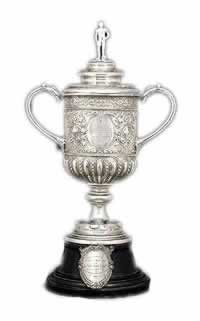
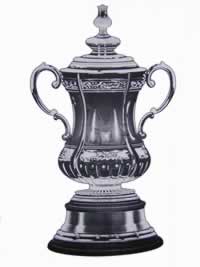 1872-1879 1880-1889 1890-1899 1900-1909 1910-1915 1920-1929 1930-1939 1946-1949 1950-1959 1960-1969 1970-1979 1980-1989 1990-1999 2000-2009 2010-2019
1872-1879 1880-1889 1890-1899 1900-1909 1910-1915 1920-1929 1930-1939 1946-1949 1950-1959 1960-1969 1970-1979 1980-1989 1990-1999 2000-2009 2010-2019
The English Football Association Challenge Cup, to give it its full title, is not the oldest football tournament in the world as is popularly believed - this distinction belongs to the Youdan Cup, played in Sheffield in 1867. There is, however, no club competition with more history, mythology or excitement attached to it than the FA Cup, which was conceived by CW Alcock, Secretary of the Football Association 1870-1895. Educated at Harrow School, he proposed a knock-out competition based on the inter-house tournament known as the Cock House Competition. From this simple concept the competition grew: there were 15 entrants for the first FA Cup - 731 in 2007-08.
The original FA Cup (left) was made by Messrs Martin, Hall & Co at a cost of £20 and was stolen from a shop window in Birmingham in 1895 and never recovered. A copy was made and used until 1910 when it was retired and presented to the FA's long-serving president Lord Kinnaird. This trophy is currently owned by David Gold, chairman of Birmingham City, who bought it at Christies for £478,400 in 2005. A new and larger trophy (right) was commissioned from Fattorini's of Bradford and used between 1911 and 1991 when it was also retired due its increasing fragility. The current trophy is an exact copy of the third FA Cup and has been in use since the 1992 final. There is, in fact a fifth trophy, another exact copy which will be introduced if the original is lost, damaged or destroyed.
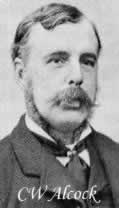 Since 1888 the competition has been divided into a qualifying competition and the competition proper (which starts with the First Round) while teams playing in the top two tiers are exempt until the Third Round. In this way the stronger teams do not waste their time playing the very smallest sides in the early stages while allowing non-league clubs the chance of progressing to the later rounds where they might play one of the country's top teams. The draw for each round is made on the following Monday and is completely random (there are no seeds) giving the competition an unpredictability that is part of it's charm. Qualifying rounds are regionalised and the First and Second Rounds were divided
Since 1888 the competition has been divided into a qualifying competition and the competition proper (which starts with the First Round) while teams playing in the top two tiers are exempt until the Third Round. In this way the stronger teams do not waste their time playing the very smallest sides in the early stages while allowing non-league clubs the chance of progressing to the later rounds where they might play one of the country's top teams. The draw for each round is made on the following Monday and is completely random (there are no seeds) giving the competition an unpredictability that is part of it's charm. Qualifying rounds are regionalised and the First and Second Rounds were divided 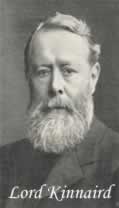 into northern and southern sections until 1997.
into northern and southern sections until 1997.
The FA Cup is famous for acts of "giant-killing," when sides from the lower leagues defeat much higher ranked opponents. There is a useful article on the topic available here on Wikipedia. The final itself is a great leveler and the favourites have as often as not been beaten by unfancied opponents.
In its early years the competition was dominated by the former public school, university and military teams from southern England. As the game took hold in the industrial centres of the north and midlands, there was a shift to the new breed of clubs, which drew their support from the working classes. Since the formation of the Football League in 1888, only one non-league club has won the trophy, Tottenham Hotspur who were in the Southern League when they won in 1901.
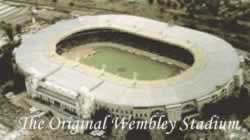 The finals were played at Kennington Oval until 1892 and at Crystal Palace between 1895 and 1914 (details of other venues used are included in the galleries). Since 1921 the traditional home of the FA Cup final has been Wembley Stadium although between 2001 and 2006 they moved to the Millennium Stadium in Cardiff while Wembley was rebuilt.
The finals were played at Kennington Oval until 1892 and at Crystal Palace between 1895 and 1914 (details of other venues used are included in the galleries). Since 1921 the traditional home of the FA Cup final has been Wembley Stadium although between 2001 and 2006 they moved to the Millennium Stadium in Cardiff while Wembley was rebuilt.
Beginning with the 1994-95 competition, the FA Cup has been sponsored but in order to protect its special identity, the name has not been changed, and is now described as the "FA Cup sponsored by..."
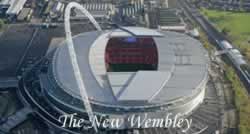 Since the 1920s finalists have often worn special commemorative kits for the occasion. Replicas of many of these are available through our affiliated partners - just click on the BUY FROM icon to go straight to the item that interests you.
Since the 1920s finalists have often worn special commemorative kits for the occasion. Replicas of many of these are available through our affiliated partners - just click on the BUY FROM icon to go straight to the item that interests you.
I am indebted to the excellent FA Cup Finals web site and have drawn on it heavily when writing the narrative for these galleries.
The Galleries:
1872-1879 1880-1889 1890-1899 1900-1909 1910-1915 1920-1929 1930-1939 1946-1949 1950-1959 1960-1969 1970-1979 1980-1989 1990-1999 2000-2009 2010-2019